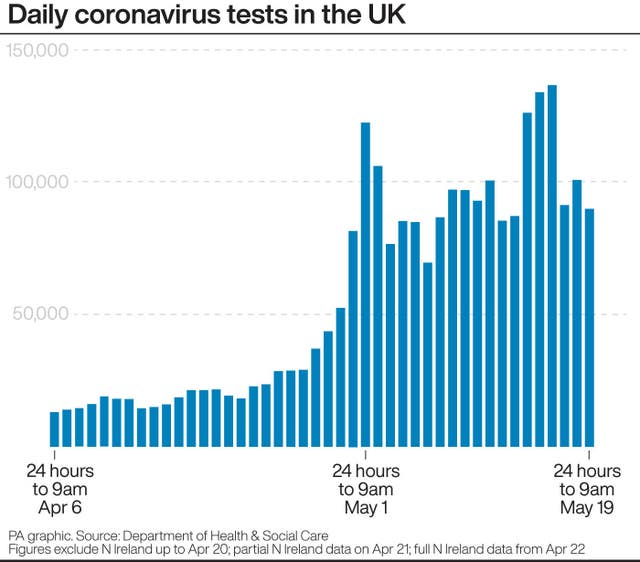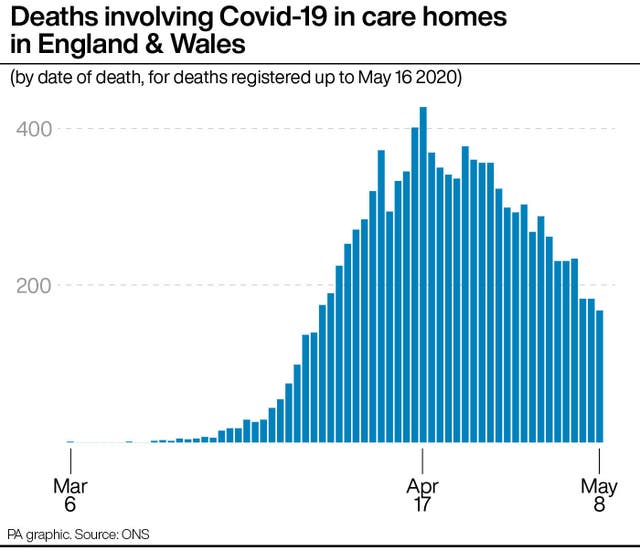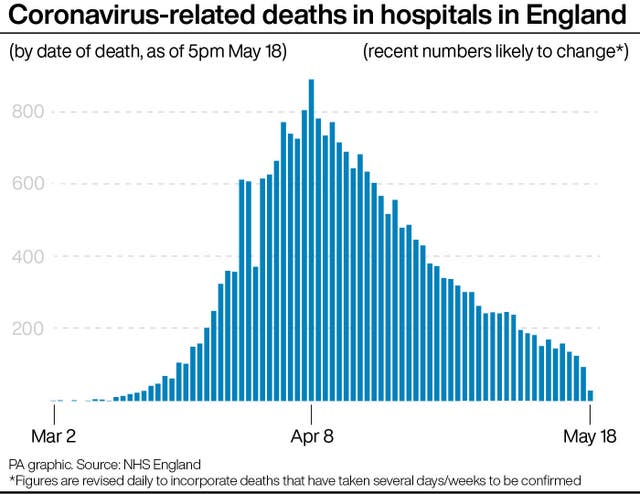
Ministers have sought to defend the Government’s handling of the coronavirus crisis in care homes amid accusations their pandemic planning was inadequate and focused on the NHS.
The head of care home providers, Professor Martin Green, said infected patients were discharged from hospitals into homes, while NHS medical support was withdrawn.
New figures suggest around 15,000 care home residents have died with the virus.
Prof Green told MPs on the Health and Social Care Committee that despite promises from ministers, there were still huge issues with testing, with results lost and staff waiting eight to 10 days to find out if they have coronavirus.
He said: “We should have been focusing on care homes from the start of this pandemic.
“What we saw at the start was a focus on the NHS which meant care homes often had their medical support from the NHS withdrawn.
“We also had the disruption of our supply chains for PPE (personal protective equipment).
“We also saw people being discharged from hospital when we didn’t have the testing regime up and running.

“So despite what’s been said, there were cases of people who either didn’t have a Covid-19 status, or who were symptomatic, who were discharged into care homes.
“Now given that care homes are full of people with underlying health conditions, I think we should’ve looked at focusing on where the people at most risk were, rather than thinking about a particular organisation.”
But Environment Secretary George Eustice rejected the assertion that the Government had made mistakes over its handling of care homes during the crisis.
However, he acknowledged some residents with asymptomatic coronavirus may have been discharged from hospital.
Mr Eustice told the daily Downing Street press conference: “We don’t accept the caricature that we took an approach that was wrong.
“Very early on in this epidemic, we had protocols in place for care homes, there was guidance as to how they should approach things.
“As the situation developed, then more stringent policies were introduced by way of policy around discharge, and we got to the point where everybody was tested before discharge.
“But in those early weeks there will have been some instances where people may have been discharged who were asymptomatic, there may have been some, a small number of instances, where they may have been showing symptoms but would have been isolating.

“That was the guidance at the time that was in place, but we have strengthened that very much ever since then, we now have testing and a rigorous discharge policy that’s in place and that is getting stronger all the time.”
It came as:
– The Department for Health said 35,341 people have died in hospitals, care homes and the wider community with coronavirus in the UK as of 5pm on Monday, up by 545 from the day before.
– Official figures revealed benefit claims in the UK soared by more than 69% in April after the coronavirus lockdown gripped the labour market.
– The Chancellor warned the UK economy may not bounce back straight away from the massive crisis caused by the pandemic.
– More than 175 frontline health and care workers have died after contracting Covid-19.
– MPs were warned quarantine restrictions aimed at preventing overseas visitors bringing in new cases of coronavirus could lead to shortages of workers to harvest fields and pick fruit.
As of 9am 19 May, there have been 2,772,552 tests, with 89,784 tests on 18 May.
248,818 people have tested positive.
As of 5pm on 18 May, of those tested positive for coronavirus, across all settings, 35,341 have sadly died.
More information in the tweet below 🔽 pic.twitter.com/uRtdHU6yU4
— Department of Health and Social Care (@DHSCgovuk) May 19, 2020
Professor Dame Angela McLean, the Government’s deputy chief scientific adviser, said focusing testing on hospital patients early on in the Covid-19 outbreak was the “right thing” to do.
She told the press conference: “I think I would agree that at the time, with the testing we had, the right thing to do was to focus it on people who were really sick in hospital, so we knew who in hospital had Covid, so it was the right thing to do at the time.”
And she said the UK has looked closely at contract tracing systems in other countries and praised the work of South Korea, where “inspiring” contact tracing work has been done “to the extent that they are now down to handfuls of new cases every day”.
Earlier, answering an urgent question in the Commons, Health Secretary Matt Hancock again insisted that hospital patients were discharged to care homes at a time when community transmission of Covid-19 was low.
He said the guidance to care homes that was in place until March 13 “was in place whilst community transmission was low and said it would be updated as soon as transmission went broader and that’s exactly what we did”.

In early March, England’s chief medical officer Professor Chris Whitty warned MPs it was “highly likely” community transmission of coronavirus in the UK was already happening.
On discharging hospital patients to care homes, Mr Hancock said it was “important to remember that hospital can be a dangerous place for people” and can carry risks.
He stood by the principle of discharging patients to care homes, saying: “It is appropriate in many cases for people to be discharged from hospital and safer for them to go to a care home.
“What’s important is that infection control procedures are in place in that care home, and those infection control procedures were put in place at the start of this crisis and have been strengthened…as we’ve learned more and more about the virus, all the way along.
“And as the clinical understanding of coronavirus has strengthened, so too, we’ve updated and strengthened our guidance.”


Comments: Our rules
We want our comments to be a lively and valuable part of our community - a place where readers can debate and engage with the most important local issues. The ability to comment on our stories is a privilege, not a right, however, and that privilege may be withdrawn if it is abused or misused.
Please report any comments that break our rules.
Read the rules hereLast Updated:
Report this comment Cancel